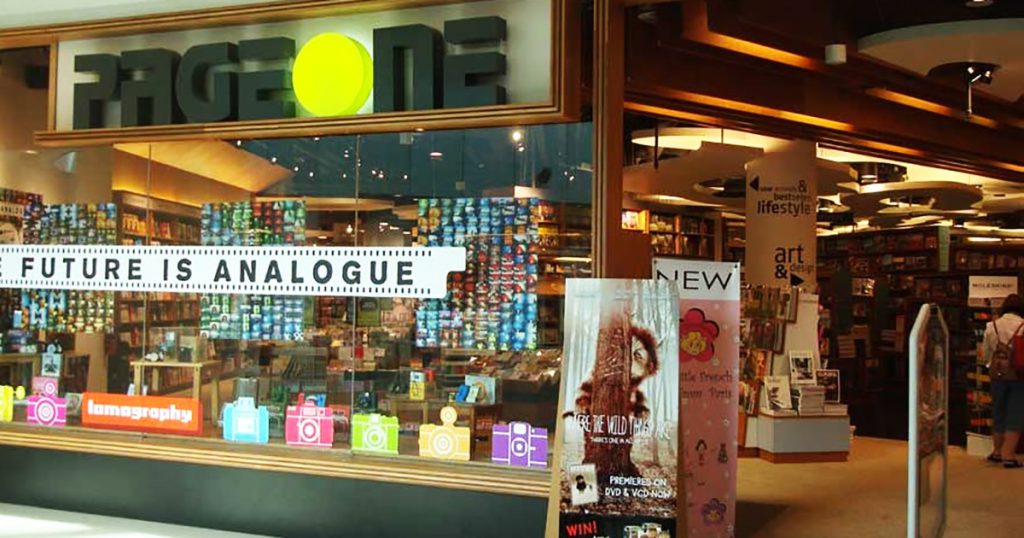Another day, another brick-and-mortar business bites the dust.
This time though, it’s less of a closing down but more of a remodelling.
Making a comeback at The Cathay mall, Page One bookstore is now positioning itself as a bargain bookstore, selling its books for as low as $1.
Says Inez Maria, its senior sales and acquisition editor to The New Paper, “This location is not the best, but the price point is attractive enough for customers to buy five to six books per transaction.”
Its opening sale till 11 June sees its books, all new, being peddled for 50 cents to $5.
While sales are considerably brisk with this model, its reality now is a far cry from its glory days in the 90s and 2000s.
Starting At Page One
Page One, founded by Singaporean Mark Tan back in 1983, started off as a “small shop with slanting shelves” in a shopping mall, stocking handpicked art and design books.
In 2006, its massive flagship store in Vivocity mall was officially unveiled, with Dr. Vivian Balakrishnan (then Minister for Community Development, Youth and Sports) gracing the opening.

“The publishing sector alone contributed $836 million to GDP and employed more than 6,000 people in 2004,” revealed Dr. Balakrishnan then, emphasising the significance of Page One’s expansion.
Besides retail, the company had also gone into book publishing and distribution (particularly art and design books) – with titles being translated into 13 languages including French, Spanish, Dutch, Russian, Japanese and Chinese.
Not just sticking to the local market, the bookstore had been expanding overseas to China (June 2010), Hong Kong (1990s), Thailand and Taiwan.

And it’s not just any ordinary bookstore – CEO Mark Tan and his brother Kay Ngee Tan, an architect, also incorporated Southeast Asian art into their store.
Changing the decor every season, their initiative is also said to have “brought about the rise of ‘giant-sized’ bookstores in Asia”.
In Beijing, the stores have also been described by The Beijinger writer Michael Wester as “fun to browse”, with a wide range of high-end books and a mix of literary and non-literary knick-knacks.

Its 35,000 square-foot store in Tsim Sha Tsui, Hong Kong was also half-bookstore, half-retail and lifestyle – including a bakery, restaurant, florist, as well as showrooms selling furniture, homeware and gifts.
“We can’t sit here and wait for books to fly off the shelves, we have to make the shopping experience more attractive,” said Tan.
The Steady, Painful Demise Of Page One
However, all the decor, diversification, and events didn’t seem to help retain its customers.
With the advent of online bookstores, readers had access to books at lower price points – a strategy that brick-and-mortar shops could not afford to risk taking on.
In 2012, after its 5-year lease ended, it closed the shutters on its sole Singapore outlet.
The situation was similarly bleak overseas, with its last 2 outlets in Hong Kong closing in November last year. In its heyday, there were 10 outlets in Hong Kong – 6 located within the airport itself.

Its 2 outlets in Taiwan, located at Taipei 101 and Sogo department store at Fuxing Road have also been closed since 2015 and 2009 respectively.
As of now, the fate of its Chinese and Thai stores still remain bleak.
A War That Cannot Be Won?
News of e-commerce trumping brick-and-mortar is nothing new.
While we see occasional success stories like the Apple store and Miniso garnering crowds and making waves in the retail scene, they remain far and few between.
Malls are emptying out, and retail empires are crumbling at alarming rates.
Even with diversification of its stores, a strategy that is often cited to be effective in retaining customers, Page One still failed to retain its hold in Hong Kong – a market it had been in for close to 20 years.
So is there really a magic formula that retail needs to adopt, or is it simply doomed to fail, as e-commerce takes over?
And while Page One has risen from the ashes in Singapore with its new bargain bookstore, it’s uncertain if this model will be sustainable in the long run.
Watch this space for updates.
Featured Image Credit: phinixs.blogspot.sg











